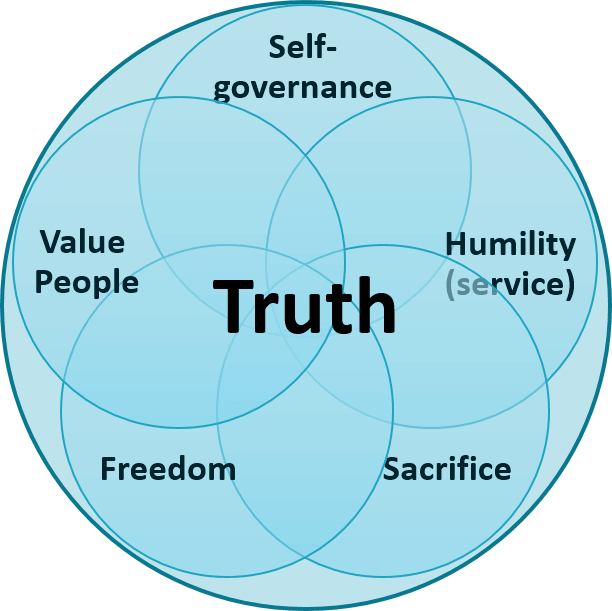If you desire to lead, you must have six critical leadership values. You can only be a great leader if you have great values. Unfortunately, great values are highly underrated. But those values make the difference between being a GOOD or BAD leader.

As a leader, when you subject your leadership to the six critical leader values, you not only do what is best for your organization, but you also do what's best for the people. The six critical leader values are more important than all your leadership skills and capacities. Why? Because your excellence in all five Essential Leadership Capacities still leaves the likelihood that you are a BAD leader!
How is that possible?
Think about some of the most destructive leaders you know from history. For example, consider Hitler. Rate him in the following areas. Did he...
- …consistently get results - get things done?
- …execute his plans well, effectively?
- …create and encourage teamwork?
- …encourage change and innovation?
- …communicate well?
He rates relatively high on most scales if you only consider those items. So, does his high ranking on leader skills and capacities make him a good leader? Obviously not! He was a horrible leader. He excelled in the five capacities but destroyed people and created mass destruction! It is highly incorrect if you classify him as a good leader!
So, what makes him such an evil, destructive leader?
His bad values drove his thinking and actions for the horrors he led and committed.
A Better Way to Define Leaders
So, if skills and capacities do not make you a great leader, what does? Do you remember that "structure demands behavior?" If not, review course 2.01 - Value Right Results AND People. And check out Robert Fritz's books and teachings.
Here is the big idea, the six critical leader values create a path of least resistance to HOW you get the results you want.
If you use the following six critical leader values, you are unique. Why? Because too many experts overlook most of these values when they teach leadership. As a result, leaders hurt organizations and the people in them even when they have superior skills and capacities.
But, ALL six of these leadership values are in the GR8 Leaders CATALYST System. We call them the 6 Critical Values of GR8 Leaders. All are important, but truth, self-governance, and freedom receive the most attention because they are seldom taught with leadership.
1. SELF-GOVERNANCE
The GR8 Leaders' definition of self-governance is "passing up immediate gratification for future benefits."
That also defines self-control. Whenever you read self-governance, it also refers to self-control. For example, when others aren’t doing good work, you do good work anyway. Even when no authority is there, you do good work. Or you do what is right even though others pressure you to do otherwise.
Why is self-governance needed?
Of the six critical leader values, this one probably increases the capacity of an organization the most. It helps get more done because it frees up supervisory time and resources. Think about an organization where everyone self-governs. They focus on reaching the organization's goals. Now compare that picture to what usually happens - lots of action by many, others do what they believe is best, and some even work against the organization's goals.
Leaders with self-governance serve the needs of the people and the organization. They also coach everyone to self-govern.
A key focus to help you is your pursuit of accountability. Additionally, you are teachable, know the boundaries, understand the consequences, and identify the expectations others have of you. Consider how different that is from most people in organizations or anywhere.
2. HUMILITY
The GR8 Leaders' definition is "power under control."
That isn't the dictionary definition of humility because the dictionary says humility is...
- marked by meekness or modesty in behavior, attitude, or spirit
- not proud or arrogant; modest, unpretentious, courteously respectful
There is no disagreement with the dictionary, but people assume weakness is part of humility. For example, reading the word meekness encourages thoughts of weakness unless you understand meekness.
Humility constrains selfishness enough to serve others and make things about them, not "ME." Humility helps you control your strengths so that you use them to benefit others instead of magnifying yourself. And, if your strengths are needed, you gladly volunteer without false humility.
For example, you do not draw attention to yourself and do not comment on or highlight your strengths compared to others. Only rarely is that ever needed.
People with excellent values do not boast about themselves, what they have, or how much talent they have. They talk about you and your life without needing to tell you how much they have done or how great they are.
Why is humility needed?
Because you focus energy and benefits on the organization and others rather than yourself. Leaders who do not focus on themselves help organize the energy of everyone to accomplish goals and get things done. They do it even if it is not best for them. That creates a benefit for all 5 of the leadership capacities.
A key focus to help you is to serve others. When you serve, it moves the focus to others, not you.
Humility is abstract and easily misunderstood, so it helps to have something more concrete. Service isn't the only aspect of humility; it is a good compass or test.
Level 5 leaders channel their ego needs away from themselves and into the larger goal of building a great company. It’s not that Level 5 leaders have no ego or self-interest. Indeed, they are incredibly ambitious—but their ambition is first and foremost for the institution, not themselves.—Jim Collins - Good to Great
3. SACRIFICE
The GR8 Leaders' definition is "committed to giving up things you value to benefit the organization and others."
You give up the advancement of self for the advancement of others. This may be the most challenging and underrated of the six critical leadership values.
An example is the sacrifice fly in baseball. A batter hits a fly ball to the outfield to advance a runner already on base. The batter is out if the fly is caught, which does not help his batting average - but the runner advances, which helps the team. The batter that is more interested in his batting average will reluctantly agree to follow the instructions to sacrifice for the team's good.
Why is sacrifice needed?
It energizes commitment and moves beyond talking about helping the organization and others to do something that helps.
When anyone, especially a leader, shows this value, it motivates the team. It is a clear example of actions beyond words.
A key focus to help you is courage, contentment, and a long-term view. That truly requires courage to move beyond the present and take a risk on the future - as you saw earlier with self-governance.
…participants elicited higher positive emotions and a stronger willingness to work together with the leader when the leader exhibited self-sacrifice rather than self-benefiting behavior… these effects were considerably stronger when the leader did not act in an autocratic (i.e., pushy) manner. - David De Cremer - The Leadership Quarterly 17 (2006) 79-93
4. FREEDOM
The GR8 Leaders' definition is "not controlling or being controlled."
For example, invite, rather than demand, compliance with rules and procedures.
This is one of the most powerful of the six critical leader values because the invitational model of leading increases the commitment and effort of those in the organization. How is that possible?
Consider the difference between "have to" and "want to." When you decide to do something because you "want to," the result is an effort you freely expend without threats or rewards. If people are in an organization because they want to be there, they tend to exert more significant effort toward the goals of the organization.
When people "have to," it de-energizes them, and there is more energy to rebel against what they "have to" do. Take a look at course 06 - Use Less, Not More Control to study how superior the freedom or invitational approach is for leadership.
Why is freedom needed?
It enhances the morale and productivity of people and managers. So much of good leadership requires the proper understanding and use of freedom!
A key focus to help you is to choose responsible freedom, pursue the best for others, and accept that others have the freedom to ignore you.
5. VALUE AND DEVELOP PEOPLE
The GR8 Leaders' definition is "value people enough to coach them to higher capacity."
For example, when you help a person develop a strength or skill they need or want.
Coaching requires the six underrated leader values, particularly Sacrifice, Humility, and Truth. We like to define coaching with the word FOCUS - the five elements you see to the right.

Why is this value needed?
It enhances individual and organizational capacity without a need for additional resources. Coaching someone adds capacity to the individual but requires diligent effort on the part of the coach.
A key focus to help you is to coach rather than command people. Please get to know the people and spend time with them, so you see them as people, not objects or resources.
Consider this Harvard Business Review article that shows the benefits of valuing people ("Half of Employees Don’t Feel Respected by Their Bosses," November 19, 2014). If the employee feels respect, the organization and people benefit.
- 56% better health and well-being
- 89% greater job enjoyment and satisfaction
- 92% greater focus and prioritization
- 1.26 times more meaning and significance
The sad news of the study showed that 54% of the 20,000 people in the survey did not regularly get respect from their leaders.
Finally, consider this great news. Getting the results above requires NO MONEY, change in benefits, or remodeling the office! It only requires your commitment to using the underrated leader values.
6. TRUTH
The GR8 Leaders' definition is "what is real, genuine, and actual."
For example, you look at the profit and loss statement and see the reality that you are not profitable right now. You do not offer excuses. Instead, you use your energy to help the situation change.
Most Powerful Value
Truth is the most powerful of the six critical leader values. Truth is a synonym for reality. Unfortunately, far too many people show no interest in reality. Fantasy or subjectivity is more important to most people. A big problem I encounter is people who think they see reality but do not.
- They perceive reality to be BETTER than it is or,
- They perceive reality to be WORSE than it is
The result is they do not see REALITY.
SUBJECTIVITY - How it FEELS!
The truth kept wandering in and out of her mind like a lost child, never pausing long enough to be identified. – Margaret Millar
REALITY - How it IS!
The truth is tough. It will not break, like a bubble, at a touch … you may kick it about all day, like a football, and it will be round and full at evening. – Oliver Wendell Holmes, Sr.
Why is truth needed?
It creates a stable foundation where you build viability and advantage. Without the stability of truth, you wobble from one conclusion to another. Truth allows an unwavering standard to rely on, especially for behaviors.
And, yes, there is "TRUTH" and your perception of it. Truth does not care about how you perceive it; it is still valid. Gravity does not care if you believe you can fly by flapping your arms; it will still operate with or without your belief in it.
A key focus to help you is a willingness for objectivity, suspending assumptions and opinions, asking questions, and listening.
That is a critical question to wrestle with!
